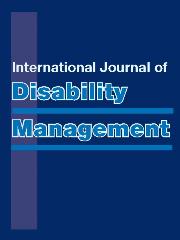No CrossRef data available.
Article contents
The study of best practice for developing social enterprise for people with disabilities
Published online by Cambridge University Press: 12 November 2014
Abstract
The study of social enterprise development model for people with disability aimed to establish a fundamental knowledge to apply the concept of social entrepreneurship to enhance the quality of life for the disabled as well as to provide them with the capacity building. Equally importantly was the development of social enterprise sector particularly for those with impairment in Thailand based on the local context and pattern appropriate together with research in order sustain the model for the benefit of people with disability in the country. This research investigated case studies of social enterprises for those with disability from various businesses including group of disabled agriculturalists who operated a Goat Farm in Rayong Province, The Center for Intellectually Disabled Innovation as well as Betimes Solution Co.,Ltd. The study implemented literature review, in-depth interview, questionnaire as well as observation. Summary of the study is presented below. 1. Models of social enterprise based on case studies were different. This could be classified by using the three major components including organizational mobilization, stakeholder engagement and profit management. The study revealed that group of disabled agriculturalists who operated a Goat Farm in Rayong Province could be categorized as a philanthropic model while Betimes Solution Co.,Ltd could be regarded as a commercial pattern. Center for Intellectually Disabled Innovation, on the other hand, comprised of a hybrid model. All of these signified the fact that social enterprise development model could be various. 2. Key social enterprise factors for the business engaged with disabled people based on the case studies could be ranked with three major components including competitive advantage to compete with other businesses and sustain themselves, social entrepreneurship to be able to achieve both financial and social mission effectively with skills, knowledge and confidence and lastly stakeholder engagement to manage the relationships with key partners and become accepted by all parties concerned.
Information
- Type
- Abstract
- Information
- Copyright
- Copyright © The Author(s) 2014

